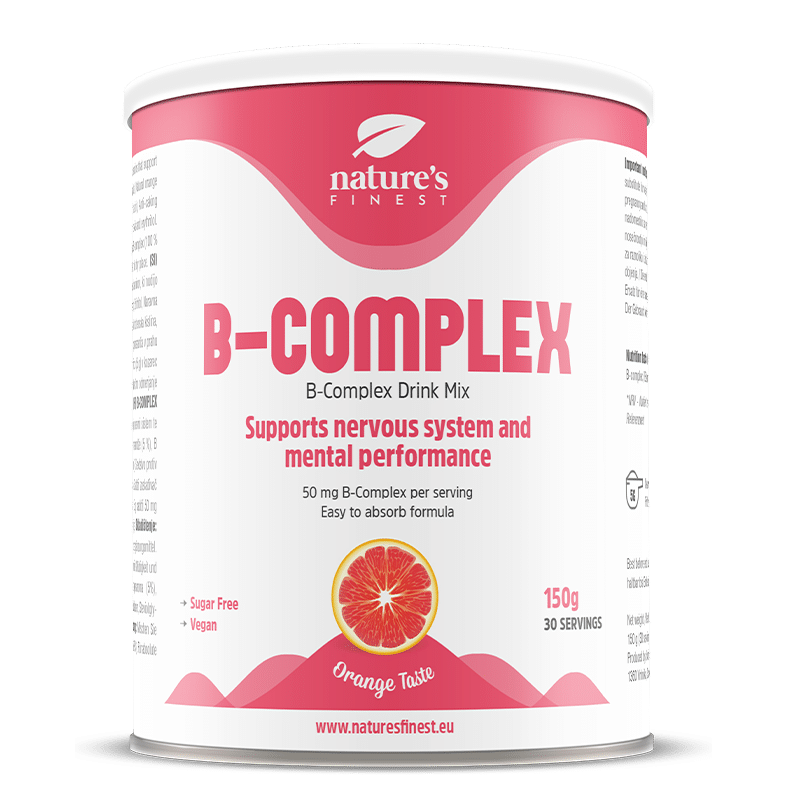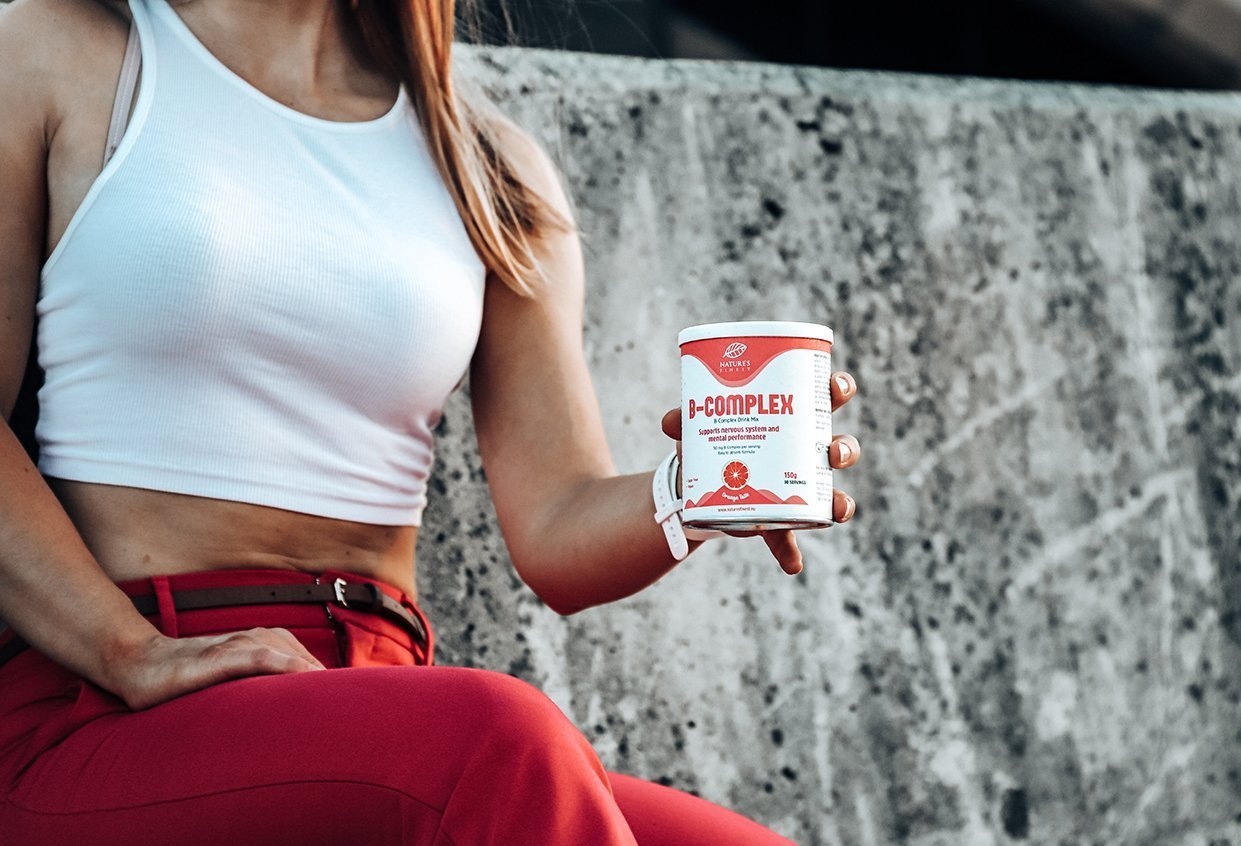B-complex to boost energy and well-being
B-complex is often called the energy vitamins, but it will be more true if we imagine these vitamins only as keys that unlock energy and well-being.
Many of us are confused and don’t know which individual vitamin B is needed. But no worries. The B-complex helps cover the needs for all B vitamins. There are several different types of vitamin B, and each one has a slightly different role in the body. Some vitamins work together as a group, so it’s crucial to get all of them in a good balance. A lack of one vitamin, or an increased need for it, causes an increased need for other B group vitamins.
Let’s get to know the important B group vitamins!
We know 12 B vitamins. The human body essentially needs 8 of them, which together we call the B-complex. Individual B vitamins are classified by specific names and numbers (eg B1, B2, folic acid, etc.).
Thiamine, known as vitamin B1, was one of the first organic compounds to be recognized as a vitamin in early 1930s. It is associated with the metabolism of carbohydrates and branched-chain amino acids (proteins), thus it helps release energy from food, stimulates normal appetite and supports the proper functioning of the nervous system.
Why we need the B group vitamins?
B vitamins act as coenzymes that help the body obtain energy from food, thus take care of metabolic processes (lipid metabolism, protein metabolism, sugar metabolism). The benefits of B vitamins for our health are numerous. B vitamins promote a healthy nervous system and support our body in breaking down food, so that it can use the energy as fuel. These vitamins play a vital role in skin health, liver health, red blood cell production, support the nervous system and stimulate normal appetite
A healthy and balanced diet can provide the daily intake of essential B vitamins, but they are water-soluble and therefore not stored in the body. This means that we have to constantly replace them every day. Given today’s lifestyle, the majority of diets can only be enriched by natural dietary supplements, such as B-complex.
B vitamins and exercise
B-complex in large quantities is needed by those who exercise often, do sports or lose weight. Various B vitamins play an important role in metabolism. For example, vitamin B1 supports the body to convert glucose into energy, accelerate the consumption of glycogen. Vitamin B2 can help fat burning. Vitamin B6 can work together with vitamin B1, which strengthen the muscles, to avoid muscle loss during exercise.
Vitamin B12 promotes metabolism; improves fat, sugar, and protein metabolic utilization. In addition, exercise requires a lot of water consumption, which is likely to cause loss of water soluble vitamins including B vitamins and vitamin C. And during long time aerobic exercise can increase oxidative stress, so it is very important to keep up the antioxidants intake to avoid cellular damages.
Which vitamin B is most important? It is impossible to say.
“All of them have a very important role to play,” says Roxanne Moore, a registered dietitian at the Maryland Department of Education and a representative of the American Dietetic Association. A varied, healthy diet of lean meats, colourful vegetables and whole grains usually only covers the basic needs for a proper intake of B vitamins.
This group of 8 vitamins is involved in vital processes in the body.
An unbalanced diet, a strict diet and a lot of stress can lead to a vitamin deficiency. B vitamins are the ones that help the body use the energy consumed with food. These vitamins take care of energy production and nourish the cells, as food arrives at its final destination.
Vitamin B1 (thiamine)
Vitamin B1 supports muscle, nerve and heart function. It regulates metabolic processes and digestion, and also plays an important role in the release of energy generated from glucose. Vitamin B1 is found in most foods, including vegetables, fresh and dried fruits, eggs, liver, and whole grains.
Vitamin B2 (riboflavin)
Vitamin B2 is involved in the metabolism of energy in the body, supporting the nervous system and helps remove toxins from the blood. It help maintain healthy and firm skin, hair and nails. Food sources include dairy products, meat, fish, rice, eggs and fortified breakfast cereals.
Vitamin B3 (niacin)
Niacin (nicotinic acid) maintains gastrointestinal health, relieves headaches, improves blood circulation, contributes to the normal functioning of the nervous system and gives the skin a healthy appearance. Good sources of niacin are meat, fish, wheat flour, eggs and dairy products.
Vitamin B5 (pantothenic acid)
Vitamin B5 has several functions, among other things it is important for the protection and management of emotional and physical stress, improves vitality and slows down the aging process. It is found in eggs, beef, kidneys, yeast, meat and vegetables.
Vitamin B6 (pyridoxine)
Pyridoxine is important in catalysing reactions involving fats, carbohydrates and amino acids in blood, brain, and skin cells. Vitamin B6 is found in a wide variety of foods such as pork, poultry, fish, bread, whole grains, eggs, vegetables, soy, peanuts and milk.
Vitamin B7 (biotin)
Biotin is a B vitamin that is important for the fatty acid and carbohydrate metabolism. Bacteria that live naturally in our gut can produce biotin, and biotin is also found naturally in many foods.
Vitamin B9 (folate)
Folate is involved in embryonic nervous system development, protein synthesis and cell growth. Women of childbearing age, especially those planning a pregnancy, should enjoy a folate-rich diet such as green leafy vegetables, legumes, seeds, liver, eggs, cereals and citrus fruits.
Vitamin B12 (cobalamin)
Vitamin B12 has several important functions, thus contributes to the production of red blood cells, supports the normal functioning of the nervous system and releases energy from the food we eat. This vitamin is involved in the formation of new cells, red blood cells and thymidine, a key building block of the genetic material in every cell. The main sources of folic acid are green leafy vegetables, legumes, fruits and liver. Folic acid deficiency can occur in pregnant women. Strict vegetarians and vegans are deficient in vitamin B12 because it is only found in nutrients of animal origin.
Therefore, there are eight essential B vitamins. For each of these vitamins is set a recommended daily amount that the average person needs to consume in order to stay healthy. The B-complex supplement combines all eight in one scoop, which we stir into water, and ensures that we receive the daily recommended intake of each vitamin.

B-Complex
The highest quality and the most bioavailable form of B vitamins
- 50 mg (100 % NRV) of B-complex per dosage
- Contains 7 B vitamins
- Tasty drink with natural orange flavour
- Contributes to the normal functions of the nervous system ¹
- Helps to Reduce Fatigue ¹
and save £0.00
100% safe purchase with a no-questions-asked return policy.
